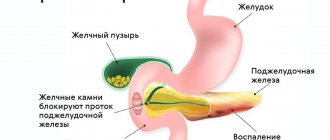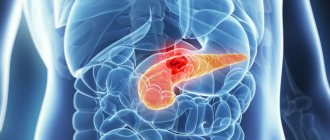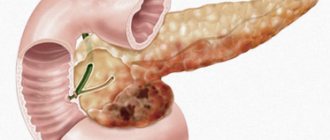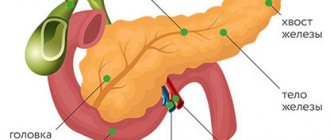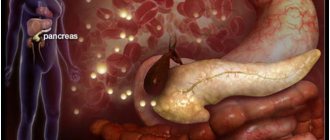The pancreas is an organ that performs endocrine and digestive functions. With the development of tumor processes in it, the cells that produce insulin and other substances necessary for the functioning of the body are replaced with pathological ones. As a result, the functional activity of the organ as a whole decreases, which is manifested by digestive disorders and the development of secondary diabetes.
Pancreatic tumor markers are biological substances that are produced by such pathologically altered cells. They are present in a healthy body, but with the development of a tumor process their concentration increases significantly. Let's look in more detail at what it is, when you need to take tests for markers of cancer, and also which indicators are considered normal and which are pathological.
What are tumor markers
Every person's body contains a certain number of tumor cells. They produce specific proteins that enter the bloodstream. As the tumor grows, the number of such cells increases many times, which leads to a significant increase in the content of tumor markers in the blood.
Types of tumor markers characteristic of different organs
Glycoprotein CA 19-9 is a protein specific for pancreatic cancer. This marker is produced by epithelial cells of the digestive tract. With the development of oncological pathology, its amount in the body increases significantly. Therefore, an increase in the level of CA19-9 can be considered a sign of a pancreatic tumor process.
More than 45% of patients with carcinoma of this organ have an excess of the normal value of the indicator. Depending on the concentration, one can also judge the prevalence of tumor cells:
- when CA 19-9 is elevated more than 1000 units per ml, then metastasis to the lymph nodes is expected;
- a level above 10,000 U/ml indicates hematogenous dissemination, which is typical for the fourth stage of the disease.
Also, based on this indicator, one can assume the possibility of effective treatment of the tumor:
- at levels above one thousand U/ml, only five percent of patients are operable;
- among patients with an indicator of up to a thousand U/ml, more than half can be successfully operated on.
Important! Despite the fact that increased levels of markers are characteristic of certain types of oncological pathology, these laboratory indicators do not have absolute specificity. Therefore, diagnostics should always be comprehensive and also include imaging studies.
Symptoms in later stages
When the tumor begins to grow, new symptoms appear:
- Increasing abdominal pain, which intensifies at night and when bending the torso forward.
- The appearance of jaundice and skin itching. At the same time, the urine darkens, the feces lose color, and the skin has a greenish tint. As a rule, in this state the body temperature remains normal.
- Loss of appetite, nausea and vomiting, diarrhea and steatorrhea, that is, serious digestive disorders.
If metastases begin to spread, then when the stomach is damaged, bleeding occurs. This is manifested by dark-colored vomit and deep black stool. Diabetes mellitus in its usual manifestations is in no way associated with pancreatic cancer. But in combination with other symptoms it should cause concern. In the later stages, when metastases spread, fluid accumulates in the abdominal cavity, and the abdomen noticeably enlarges.
Indications for examination for tumor markers
It is recommended to analyze the level of pancreatic tumor markers in the following cases:
- identifying cystic formations;
- benign tumors;
- the presence of symptoms characteristic of oncological pathology;
- pseudotumorous form of pancreatitis.
At the same time, the analysis is often prescribed as a screening, that is, to identify patients with suspected breast cancer among large groups of the population.
Blood sampling for tumor markers is carried out from a vein
After complex treatment of the tumor, the number of CA 19-9 is determined for patients. This is necessary in order to determine the effectiveness of therapy and predict the further development of the disease. Also, such patients are regularly examined to timely determine tumor relapse or metastasis.
Why us
- Doctors. The specialists of our medical center are highly qualified and have experience, including in foreign clinics.
- All major tumor markers We conduct a wide range of studies on tumor markers of various organs
- Expert diagnostics. The hospital’s modern diagnostic complex allows both screening and more in-depth studies (radiation, endoscopic, genetic) to determine cancer diseases with high accuracy.
- Genetic laboratory Our geneticists will help you select a genetic diagnostic method to identify a hereditary predisposition to breast, ovarian, gastrointestinal, skin, blood, kidney, prostate and many other types of cancer.
- Complexity. Our own high-tech treatment base allows us not only to diagnose, but also to successfully treat cancer pathologies using chemotherapy (including targeted drugs) and surgery of any complexity.
- We value your time. All treatment and diagnostic departments are located in one hospital building, which saves your time and effort.
You can see prices for services
Types of GI tumor markers
There are several types of cancer markers that may indicate the presence of a tumor of the pancreas and other organs of the digestive system. After conducting several studies, we can guess which organ could cause the disease.
| Marker | Norm | Peculiarities |
| SA-242 | No more than 30 U/ml | Produced by cancer cells. An increase is observed in the presence of inflammatory processes in the organ, cystic and tumor-like formations. Along with an increase in its level, there is an increase in the amount of SA 19-9 |
| SA 19-9 | Up to 40 U/ml | This pancreatic tumor marker is produced not only by the tissues of the digestive tract, but also by bronchial epithelial cells. An increase in content may indicate a tumor process in the pancreas, gall bladder or intestines. In inflammatory diseases, cholelithiasis, cirrhosis, a slight excess of the permissible level may be observed |
| CA 125 | 6.9 U/ml | It is produced by cells of the respiratory tract, but in pancreatic cancer its level increases. A slight increase in blood concentration is possible during pregnancy, with cirrhosis of the liver, hepatitis, pancreatitis |
| SA 72-4 | 20-30 U/ml | Produced by intestinal epithelial cells. An increase in level is noted in the same cases as for the previous marker |
| AFP | 5-10 U/ml | This marker is produced by liver cells. An increase in content may indicate an oncological pathology of this organ, pancreas or intestine. Must be determined together with other markers |
| Tu M2-RK | 0-5 ng/ml | The production of this marker is associated with metabolic disorders at the cellular level during tumor growth. This is a specific protein whose levels increase in breast cancer. |
| CA 50 | Up to 225 U/ml | Produced in the cells of the mucous membranes. Considered the most sensitive marker of the tumor process |
Pancreatic tumors
If the level of any of the above markers is elevated above the specified norm, this may indicate the presence of the following diseases:
- digestive tract cancer;
- ovarian or gallbladder tumors;
- inflammatory processes of the liver, pancreas, cirrhosis;
- gallstone disease.
Pancreatic cancer screening
Pancreatic cancer is not the most common type of oncology, but it is one of the most dangerous and rapidly developing, which is why it is so important to diagnose it on time.
So far, there is no mass screening for pancreatic cancer in Russian medical practice, because the issue of tumor markers of this type of cancer in the blood and appropriate diagnostic methods remains controversial. But for those who are at high risk or have discovered alarming symptoms, it is important to consult a doctor in time and get examined.
Next, we’ll talk about who can be examined, what screening methods exist, and how this is done in the MedEx personal medicine clinic.
Functions of the pancreas
Damage to the pancreas is dangerous because it affects a vital organ, and an unpaired one at that. In the body, the pancreas is simultaneously an element of both the digestive and endocrine systems.
It is she who produces enzymes for digesting food - this function cannot be taken on by any other organ.
The pancreas also produces several types of hormones, including, for example:
- Insulin, which is responsible for lowering blood sugar levels;
- Glucagon is the opposite of insulin, increases blood sugar levels;
- Gastrin, which regulates the production of gastric juice in sufficient quantities.
The pancreas is small in size, but consists of several anatomical parts: head, neck, body and tail. The peculiarity of pancreatic cancer is that it usually develops in the area of the head of the pancreas. This is taken into account when diagnosing cancer and treating it.
Examination of the pancreas using the TRIMprob bioscanner
General standards for mass screening of cancer localized in the pancreas have not yet been developed, but this does not mean that there are no opportunities for early diagnosis. An accurate result can be obtained, for example, using alternative research methods. We use one of these methods at the MedEx clinic - scanning the body with an electromagnetic device TRIMprob.
The innovative bioscanner was invented in Italy, its accuracy in detecting affected cells has been confirmed by European medical practitioners. In Russia, the scanning method is not yet widespread, but our patients can already be among the first to test it - to diagnose pancreatic cancer at an early stage or to examine other systems and organs.
What is the essence of scanning and what does it show:
- The device emits weak electromagnetic waves of different frequencies and analyzes how they interact with tissues and organs (healthy and diseased cells absorb the radio signal differently);
- The device allows you to accurately determine areas that require additional diagnostics and treatment: the bioscanner responds to inflammation, benign formations and cancer cells;
- The sensor is connected to a monitor on which the doctor sees the results of the study. They are formed in a few minutes, which means that the patient does not have to painfully wait for the results of the screening.
If the bioscanner has identified “problem” areas, the doctor will prescribe additional studies to distinguish between benign and malignant processes in the pancreas and decide how to proceed with the patient further. This reflects the main idea of screening - to conduct a quick initial examination as safely as possible for the body, and then clarify the result using other methods, if necessary.
The main advantages of scanning with the TRIMprob device are accuracy, speed of examination and comfort. It is important that this is a non-invasive diagnostic method: the electromagnetic signal passes freely through the human body, while the device itself is at a distance during the procedure.
There is no need to be afraid of exposure to UHF waves, because the procedure is short-term, and the radiation power of the bioscanner is lower than that of a smartphone, which many of us hold in our hands or carry in our pockets most of the day.
Other diagnostic methods
People at higher risk may be given traditional diagnostic procedures as the first step in screening for pancreatic cancer.
These methods include:
- A blood test for tumor markers - specific substances whose concentration in the blood changes during cancer. Four tumor markers can indirectly indicate pancreatic cancer: antigens CA-19-9, CA-125, CA-15-3 and CEA (cancer embryonic antigen). However, this diagnostic method is not 100% accurate, because the level of the same substances in the blood increases in some other diseases. A test for tumor markers often gives a false positive result or does not accurately determine the location of cancer, so this method needs to be clarified.
- A blood test for specific hormones produced by the pancreas. Lack or excess of gastrin, insulin or glucagon in the blood can be caused by different types of cancer. However, this screening method is also not entirely accurate and requires additional examination.
- Ultrasound examination, during which you can evaluate the structure of the organ, size, and also identify neoplasms. The pancreas is viewed during a general ultrasound of the abdominal cavity or a special ultrasound of the glands. The required method will be determined by the doctor, who will issue a referral for diagnosis.
Also, CT (computed tomography) or MRI (magnetic resonance imaging) is sometimes used to examine the pancreas, but these methods are not used for ordinary, “routine” screening - only for advanced diagnostics. After a screening study, in addition to CT/MRI, the doctor may prescribe a biopsy if there are reasons for this.
Who is at high risk
Screening for pancreatic cancer is not indicated for everyone and is not currently carried out on a large scale in Russia, but there are people whose risk of the disease is several times higher than the average level. It is important for everyone who is at risk to regularly monitor the condition of the pancreas using a bioscanner or other research methods. This will allow you to identify possible pathology at an early stage and begin treatment on time.
In what cases can we talk about an increased risk of developing cancer:
- If there is a family history of pancreatic cancer, that is, close blood relatives have had cancer of this type;
- If some specific gene mutations have been identified that can cause pancreatic cancer (this is determined using a genetic test);
- If a person has been diagnosed with Lynch syndrome;
- If diabetes mellitus is detected;
- If diagnosed with chronic pancreatitis, long-term inflammation of the pancreas, which in some cases leads to cancer.
Also at risk are men over 60 years of age - according to statistics, they are more predisposed to pancreatic cancer than women.
People who fall into these categories may actually benefit from regular cancer screening. It is recommended that they begin examinations at the age of 50 years or earlier, depending on their state of health and concomitant pathologies. Your doctor will help you determine the optimal schedule for screening diagnostics and the age threshold for starting them.
Negative factors that can provoke pancreatic cancer
Oncological diseases in some cases arise for unexplained reasons. However, there are factors that have been shown to increase the risk of developing pancreatic cancer.
These include:
- Smoking – it increases the risk of cancer by 2 times compared to non-smokers;
- Unhealthy diet, excessive consumption of animal fats and fast carbohydrates;
- Excess weight.
An effective way to prevent diseases of the vital pancreas is, if possible, to review your habits and reduce the impact of these factors on the body. For example, when you quit smoking, the risk of getting sick gradually returns to average values.
What symptoms should you be wary of?
In addition to routine annual screening, in some cases it is necessary to undergo an urgent examination. Indications for it are obvious disturbances in the functioning of the digestive system, which may indicate cancer. Pancreatic cancer in the early stages is often indistinguishable from gastritis and other pathologies, and only a doctor can make an accurate diagnosis.
For those at risk, it is important to pay attention to the following symptoms:
- Severe pain in the upper abdomen, which can radiate to the back;
- Obstructive jaundice - the patient’s whites of the eyes, skin and mucous membranes turn yellow, the stool becomes light-colored, and severe itching may occur. These symptoms indicate that the bile duct is compressed and the normal path of bile release is disrupted;
- Any change in condition in people with diabetes mellitus or chronic pancreatitis (for example, if the nature and location of pain changes, constipation appears, the effectiveness of treatment decreases, etc.);
- Sudden weight loss for no apparent reason;
- Long-term repeated disturbances in the digestive system: vomiting, diarrhea, heartburn, etc.
If any of these disorders occur, it is important to at least make an appointment with a general practitioner, endocrinologist or gastroenterologist. The doctor will help you understand the symptoms and prescribe the necessary examination.
About prevention
Pancreatic cancer is a specific and quite rare disease that is difficult to predict. But some measures will help to at least partially reduce the risk of its development and generally maintain the health of the digestive system.
Basically, the prevention of pancreatic diseases concerns dietary habits and lifestyle:
- Increase the amount of vegetables and fruits in the diet, and the consumption of sweets, processed red meat products, smoked meats, etc. – reduce;
- Monitor your weight and try to keep it within the body mass index for your height and age;
- Quitting smoking is one of the main risk factors not only for pancreatic cancer, but also for other cancers;
- Moving more during the day has a positive effect on the condition of the stomach, pancreas and other organs of the digestive system.
Diagnosis of pancreatic cancer at an early stage in Moscow
Some groups of people are indicated for screening - regular preventive examination of the pancreas, even in the absence of complaints. If you are at risk due to a hereditary factor or due to chronic diseases, we recommend that you do not delay visiting a doctor.
Early diagnosis of pancreatic cancer at the MedEx Personal Medicine Clinic is quick and comfortable. In addition to traditional studies (for example, a test for tumor markers or ultrasound), we can undergo scanning using the innovative TRIMprob device. This is a precise modern technique that allows timely detection of not only cancer cells, but also other types of lesions - inflammation of the pancreas, benign formations.
At what age should you start regular examinations and what methods are best to choose, your doctor will tell you during an individual consultation. You can choose to be specifically screened for just one type of cancer, or you can have your entire body checked as part of a comprehensive program.
Submission of analysis
To determine the level of markers, it is necessary to collect venous blood. Before this, the patient must undergo preparatory procedures for three days. It is recommended that there be several studies - thanks to this, the reliability of the result can be increased.
To determine tumor markers it is necessary to use venous blood
Blood sampling is carried out in the morning; the patient should not eat or drink for 8 hours before the procedure. You must not drink alcohol or take medications containing ethyl alcohol for 72 hours. You should also avoid fatty, fried and smoked foods. On the day of the test, you should not smoke or take medications, and physical activity is contraindicated.
Patients undergoing treatment for cancer should be tested several times a year. This requires regular consultations with the attending physician, who will prescribe additional examinations if necessary.
Tumor markers, in combination with other diagnostic methods, make it possible to detect the presence of tumor growth in a patient even in the early stages. However, elevated levels of these proteins do not guarantee a cancer diagnosis. Only a comprehensive examination can establish the disease.
Predisposition to tumor development
No matter how trivial it may sound, factors influencing the development of pancreatic cancer include alcohol abuse, smoking, and eating fatty and spicy foods. The presence of diseases such as liver cirrhosis, diabetes mellitus, pancreatic adenoma or cyst, pancreatitis can also trigger the growth of cancer cells. Hereditary chronic pancreatitis is especially dangerous. People with this diagnosis should be seen by specialists more often. So, at risk:
- persons over 60 years of age;
- smokers;
- those suffering from pancreatitis;
- diabetic patients;
- people who have relatives who have been diagnosed with pancreatic cancer;
- those who have previously had such a diagnosis.


